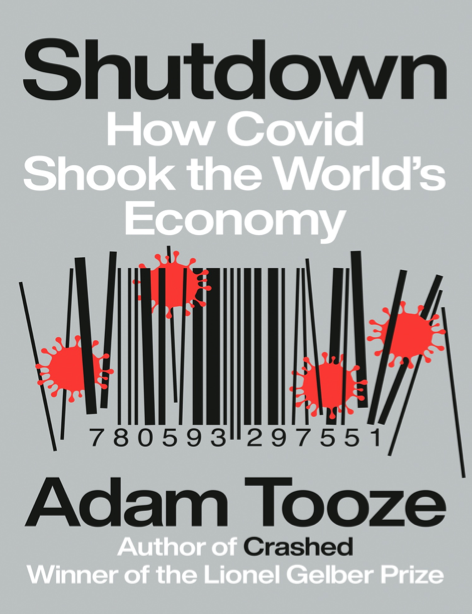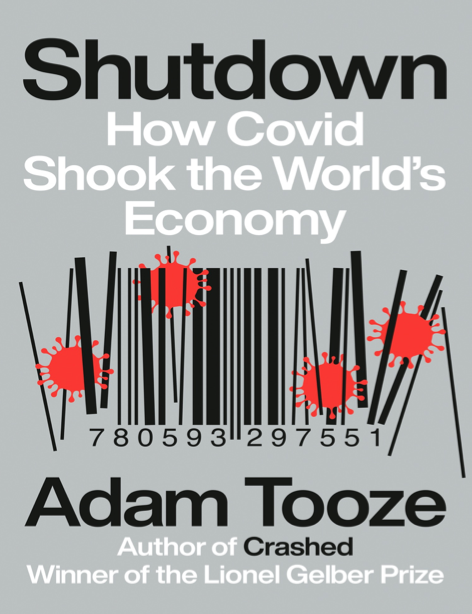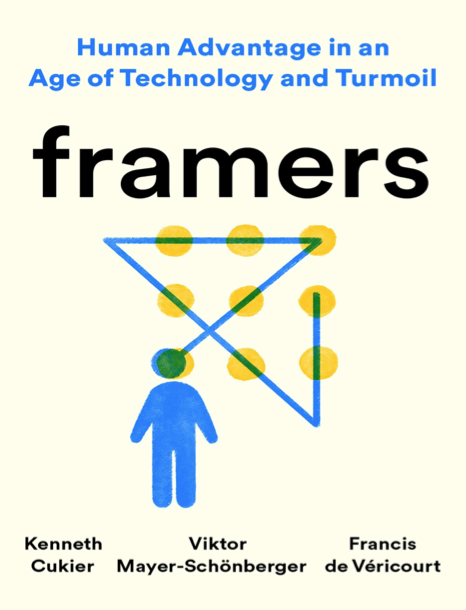Shutdown: How Covid Shook the World’s Economy | Adam Tooze
![]()
Adam Tooze Development & Growth Economics International Economics Sociological Study of Medicine Economic Policy & Development Economic History Business & Money
- درباره کتاب
- بخشی از کتاب
- نظرات
"This book’s great service is that it challenges us to consider the ways in which our institutions and systems, and the assumptions, positions and divisions that undergird them, leave us ill prepared for the next crisis."—Robert Rubin, The New York Times Book Review
"Full of valuable insight and telling details, this may well be the best thing to read if you want to know what happened in 2020." --Paul Krugman, New York Review of Books
Deftly weaving finance, politics, business, and the global human experience into one tight narrative, a tour-de-force account of 2020, the year that changed everything--from the acclaimed author of Crashed.
The shocks of 2020 have been great and small, disrupting the world economy, international relations and the daily lives of virtually everyone on the planet. Never before has the entire world economy contracted by 20 percent in a matter of weeks nor in the historic record of modern capitalism has there been a moment in which 95 percent of the world's economies were suffering all at the same time. Across the world hundreds of millions have lost their jobs. And over it all looms the specter of pandemic, and death.
Adam Tooze, whose last book was universally lauded for guiding us coherently through the chaos of the 2008 crash, now brings his bravura analytical and narrative skills to a panoramic and synthetic overview of our current crisis. By focusing on finance and business, he sets the pandemic story in a frame that casts a sobering new light on how unprepared the world was to fight the crisis, and how deep the ruptures in our way of living and doing business are. The virus has attacked the economy with as much ferocity as it has our health, and there is no vaccine arriving to address that.
Tooze's special gift is to show how social organization, political interests, and economic policy interact with devastating human consequences, from your local hospital to the World Bank. He moves fluidly from the impact of currency fluctuations to the decimation of institutions--such as health-care systems, schools, and social services--in the name of efficiency. He starkly analyzes what happened when the pandemic collided with domestic politics (China's party conferences; the American elections), what the unintended consequences of the vaccine race might be, and the role climate change played in the pandemic. Finally, he proves how no unilateral declaration of 'independence" or isolation can extricate any modern country from the global web of travel, goods, services, and finance.
Editorial Reviews
Review
"This book’s great service is that it challenges us to consider the ways in which our institutions and systems, and the assumptions, positions and divisions that undergird them, leave us ill prepared for the next crisis. . . . Whether we can overcome that incoherence and meet the challenges ahead while protecting the values at the heart of the American idea — freedom, pluralism, democracy — is the essential question posed by Shutdown."—The New York Times Book Review
"A seriously impressive book, both endlessly quotable and rigorously analytical. Tooze synthesises a huge volume of information to argue that we must prepare for a new wave of crises or risk being sunk by them. Hopefully, governments everywhere will heed his warning.”—The Guardian
"Offer insights and frameworks likely to be of enduring value… To read Shutdown feels like sitting alongside the great professor while he feverishly collates an array of data and anecdotes, attempts to chronicle what is going on, his head fizzing with ideas about what it might all mean and where it might be leading."—Financial Times
"This is truly a picture of the global impact of the crisis; it covers the disruption in the financial markets, as well as the ins and outs of government policy. . . An impressively full account of the economic developments of the past 18 months."—The Economist
"A primer on the mechanics of a global financial panic, the techniques that central bankers deployed to contain it, and the political events that ensued. Laced through these taut synopses is a meditation on a grand historical question: Did 2020 mark the end of the world economic order as we’d known it since 1980? And if so, what precisely is taking neoliberalism’s place?"—New York Magazine
"Tooze’s book offers readers a comprehensive and smartly written summary of the economic impact of the coronavirus…Tooze briskly and expertly recounts the tense weeks in March 2020 [and] routinely compares the coronavirus shutdown to the 2008-2009 financial crisis, [which] happens to make for apt comparisons, as few previous economic and health disasters can match the scale and global reach of this pandemic." —Washington Post
"[Tooze's] writing demystifies the world before us, dispelling the cloud created by the chaotic motivations and invidious narcissism of the market. Shutdown is one such cure, a book that answers so many questions about the state of the world that it will leave its readers feeling not just more learned but dizzy too. It is cliché at this point to remark that after COVID-19, everything changed; what Tooze illustrates masterfully in Shutdown is that the crisis the virus unleashed began much earlier, the world order’s fragility the product of a much longer process of mismanagement and selfishness."—Vulture's "40 Books We Can’t Wait to Read This Fall"
"Fascinating, informative, and wise...Tooze brings us to the brutal reality of Covid: it was not about money...Shutdown concludes with a plea for 'constant interplay of expertise and counter-expertise.' It is a wake-up call for us to bridge that chasm." —Paul Collier, Times Literary Supplement
"Adam Tooze makes a strong case for looking back, and beginning to draw some conclusions. . . . His focus is the period that started with Chinese President Xi Jinping’s public acknowledgement of the coronavirus outbreak on Jan. 20, 2020, and ended with U.S. President Joe Biden’s inauguration exactly a year later. The scale and variety of what unfolded in the intervening days remains dizzying. Tooze lucidly organises these events in the book’s 300 pages, while maintaining the sweeping perspective that will be familiar to readers of Crashed."—Reuters
"A comprehensive history of an unprecedented year, Tooze’s account describes how the pandemic played out politically across the globe, the interplay between climate change and the pandemic, and the myriad effects of the world economy nearly shutting down in a brief period that, as Tooze puts it, made “History with a capital ‘H.’” Readers will find this deeply informed parsing of the pandemic to be illuminating and thought-provoking."—Publishers Weekly
"Economic historian Tooze examines the unprecedented decision of governments around the world to shutter their economies in the face of pandemic . . . As the pandemic hopefully continues to fade, other crises remain. This book is a valuable forecast of future problems."—Kirkus Reviews
About the Author
Adam Tooze is a professor of history at Columbia University and the author of Crashed, winner of the Lionel Gelber Prize, a New York Times Notable Book of 2018, one of The Economist's Books of the Year, and a New York Times Critics' Top Book. He lives in New York City.










هنوز نظری ثبت نشده
اولین نفری باشید که نظر میدهید
ثبت نظر